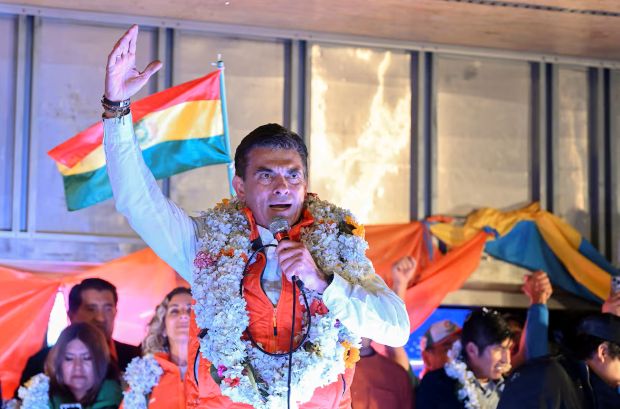Rodrigo Paz ends 20 Years of leftist rule in Bolivia
By Genevieve Glatsky
BOGOTÁ — Rodrigo Paz, a right-leaning centrist and the son of a former president, won Bolivia’s presidential election Sunday (19), propelled by voter frustration over the country’s faltering economy, political turbulence and dysfunctional institutions.
Paz, 58, defeated Jorge Tuto Quiroga, 65, a conservative former president, in a runoff that ended two decades of leftist rule.
Paz had emerged as a surprise front-runner in the first round of voting in August, climbing from the bottom of an eight-candidate field to capture 32% of the vote.
On Sunday, he received 54% of the vote, compared with Quiroga’s 45%, with more than 97% of votes counted, according to preliminary results.
The campaign was dominated by economic concerns, as rising prices, fuel shortages, and difficulties obtaining imported goods and US dollars fuelled widespread anger at the government.
Many Bolivians have grown disillusioned with the long-governing Movement for Socialism, widely known by its Spanish acronym, MAS. The party has dominated the country’s politics for nearly two decades, largely under former union leader Evo Morales. Elected in 2005 as Bolivia’s first Indigenous president, Morales spent 14 years in office, shaping the nation’s political landscape.
Sunday’s vote was the first presidential election since 2002 without Morales or a chosen successor on the ballot.
During his three terms, Morales cut poverty and invested heavily in infrastructure, education and health care. But his contested 2019 bid for a fourth term sparked mass protests, deadly unrest and allegations of fraud that drove him into exile.
His successor and ally, Luis Arce, later broke with him in a bitter feud that fractured the party. Arce, who is deeply unpopular, opted not to run for re-election. Morales, barred by the courts from running again, refused to back any candidate and urged supporters to cast null votes, which experts say hurt the left in the first round.
Analysts said Paz attracted support from left-leaning voters disappointed with the MAS but hesitant to embrace the right.
His opponent, Quiroga, promised deep economic overhauls to reduce the state’s presence in the economy.
Paz offered a more cautious path, vowing to preserve social programs, curb corruption and manage Bolivia’s resources more efficiently, while avoiding dependence on international lenders like the International Monetary Fund.
“Paz really resonated among those sectors that maybe were reluctant to go with Tuto’s more drastic proposals,” said Gustavo Flores-Macías, a professor of Latin American politics at the University of Maryland. “The appeal is more about the anti-corruption fight.”
Paz’s platform also emphasized shifting power and resources away from the central government toward local authorities, and he pledged to expand access to credit, ease import barriers and overhaul the judiciary.
Despite MAS’ decline, its focus on marginalized communities and its resistance to privatization and U.S. influence still resonate with many voters.
While Paz expressed openness toward the United States — even meeting with US officials and representatives from financial institutions during a recent visit to the country — ties with Washington were not as central to his campaign as to that of Quiroga, who emphasized attracting foreign investment.
Before the election, US Secretary of State Marco Rubio expressed optimism that both candidates wanted “strong and improved relations with the United States” after decades “of anti-American, hostile government”.
The son of former President Jaime Paz Zamora, Paz has spent two decades in politics and has served as a senator since 2020, though he has not had a major national profile until now.
His campaign gained momentum from his running mate, Edmand Lara, a former police captain turned whistleblower, whose outsider image and social media savvy drew wide attention. Many voters said they found Lara more appealing than Paz.
María Condori Nina, 55, an Indigenous woman who sells goods at a small store in a working-class neighbourhood outside the capital, La Paz, said Sunday that she was voting for Paz’s ticket only because of Lara.
“He comes from below,” she said. “He is one of us.” She said that Paz “doesn’t know poverty, he doesn’t know how we live”.
If Paz ends up having to step down, Condori said, “Captain Lara” will succeed him.
“That’s our goal,” she said. “It would have been better if he could have been the presidential candidate.”
But while Paz is viewed as a centrist and pragmatist, Lara has generated controversy with his combative tone, his criticism of the news media and suggestions that he would seek to influence Paz’s agenda.
Still, Lara struck a conciliatory tone in his acceptance speech Sunday.
“Today, the people are giving us the opportunity to govern Bolivia, but for everyone. I call for unity and reconciliation among Bolivians,” he said. “It is time to come together as brothers and sisters.”
Another voter, Zuleyka Pinto, 33, a pharmaceutical chemist, said the ticket’s strength lay in the candidates’ balance: Paz brings experience and political know-how, while Lara channels the anger and determination of Bolivians frustrated by years of poor leadership.
She supports Paz for his integrity and record of public service. She pointed to his long political career — as a council member, mayor and senator — as evidence of his readiness to lead.
“His speeches are about loving his country and never abandoning it,” she said. “That’s what a politician in any country should have: patriotism.”
-New York Times



Comments are closed, but trackbacks and pingbacks are open.